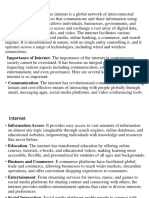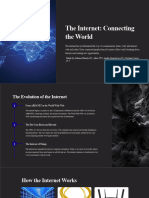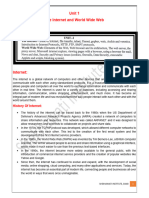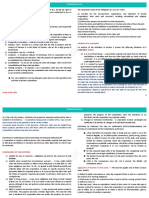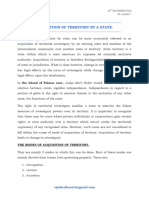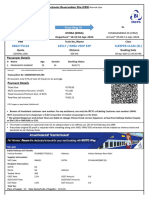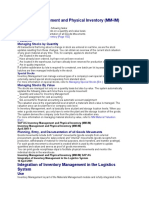Internet
Useful Inventios
Invention Description:
The Internet is a worldwide network of interconnected devices that facilitates
communication and information sharing. Using a variety of protocols, it allows the
transmission and reception of data through various networks, enabling millions of people
to connect to each other through telephones, lines, cables and satellites. Users have access
to a wide range of resources, including websites, emails, social networks and more, using
dedicated web browsers and applications.
Types of Information Texts:
The Internet was not developed by a single individual, but rather evolved over time
through the work of many researchers and engineers. One of the main contributors to its
evolution was Tim Berners-Lee, who created the World Wide Web in 1989 while working at
CERN. His development of the first web browser and server laid the foundation for the
modern Internet. The origins of the Internet date back to a network developed by the US
Department of Defense in the late 1960s, with the initial aim of facilitating communication
between research institutions and government agencies. In the following decades, the
Internet grew exponentially due to technological advances and the increasing demand for
connectivity.
Purpose and Impact:
The main function of the Internet is to facilitate communication and exchange of
information. It has revolutionized almost every aspect of modern life, having a profound
impact on society, industries and individuals. The Internet allows quick access to
information, instant communication with people around the world, financial management,
online shopping, entertainment and much more. It has become an indispensable tool for
billions of people around the world.
Innovation and Iterations:
Since its inception, the Internet has undergone several innovations and evolutions.
Advances in networking technologies have resulted in faster speeds, greater reliability, and
expanded capabilities. The transition from dial-up to broadband connections, the
development of wireless networks, and the proliferation of mobile devices have contributed
to the growth and accessibility of the Internet.
Challenges and Obstacles:
The development of the Internet has faced several challenges, including technical
limitations, regulatory obstacles, and security concerns. Issues such as privacy violations and
cybercrimes have raised questions about Internet governance and its impact on society.
User Experience:
Overall, the Internet has improved users' experience by offering easy access to a
variety of information and services. However, ease of use may vary depending on
user experience and the type of activity performed. However, the internet solves
many common problems by providing quick access to information, instant
communication and a wide range of online services and entertainment.
Legacy and Influence:
The legacy of the Internet is vast and far-reaching, having inspired countless other
inventions and transformed industries such as media, entertainment, commerce, education
and healthcare. Furthermore, the Internet has played a fundamental role in creating new
forms of cultural and social expression, such as social networks and content-sharing
platforms.
Controversies or Ethical Considerations:
The Internet has been associated with several controversies and ethical dilemmas,
including privacy issues, censorship, misinformation, cybersecurity, and misuse of personal
data. The proliferation of fake news and online harassment has raised concerns about the
impact of unregulated online speech and behavior.
Future Prospects:
The Internet will likely remain a fundamental part of society well into the future, with
continued advances in technology driving further innovation and expansion. However, it
faces significant challenges, such as the need to ensure equitable access and protect
users' rights online. Emerging technologies such as artificial intelligence, blockchain and
the Internet of Things have the potential to further transform the Internet and its
applications in the coming years.
Personal Connection:
The Internet has played a crucial role in my life, revolutionizing the way I communicate,
work, learn and play. It connects people around the world in previously unimaginable ways
and, despite challenges, remains one of humanity's most remarkable achievements,
empowering individuals and driving global innovation. I recognize the challenges and ethical
dilemmas associated with their use and the importance of addressing them in a responsible
and equitable manner.
� In conclusion, the Internet is one of
humanity's most remarkable achievements,
embodying the essence of courage and
determination in the face of challenges. As we
navigate the complexities of the digital age, it
is essential to approach the Internet
responsibly. Ultimately, the legacy of the
Internet will be defined by its ability to
empower individuals, foster innovation, and
connect the world in previously unimaginable
ways.











